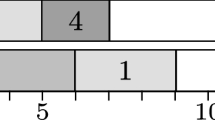Abstract
In many scheduling applications, a large number of jobs are grouped into a comparatively small number of lots made of identical items. It is then sufficient to give, for each lot, the number of jobs it involves plus the description of one single job. The resulting high-multiplicity input format is much more compact than the standard one. As a consequence, in order to be efficient, standard solution methods must be modified.
We consider high-multiplicity parallel machine scheduling problems with identical, uniform, and unrelated machines, and two classic objectives: minimum sum of completion times and minimum makespan. For polynomially solvable cases, we provide exact algorithms, while for hard cases we provide approximate, asymptotically exact algorithms. The exact algorithms exploit multiplicities to identify and fix a partial schedule, consisting of most jobs, that is contained in an optimal schedule, and then solve the residual problem optimally. The approximate algorithms use the same approach, but in their case neither it is guaranteed that the fixed partial schedule is contained in an optimal one nor the residual problem is optimally solved. All proposed algorithms are polynomial and easy to implement for practical purposes.
Similar content being viewed by others
References
Andreatta, G., Filippi, C., & Romanin-Jacur, G. (1993). The linear balancing flow problem. European Journal of Operational Research, 64(1), 68–82.
Armstrong, R., Jin, Z., & Xu, Y. (1997). A polynomial algorithm for a linear balancing flow problem (Rutcor Research Report 24-97). Rutgers University.
Bertsimas, D., & Sethuraman, J. (2002). From fluid relaxation to practical algorithms for job shop scheduling: the makespan objective. Mathematical Programming, 92, 61–102.
Brauner, N., Crama, Y., Grigoriev, A., & van De Klundert, J. (2005). A framework for the complexity of high-multiplicity scheduling problems. Journal of Combinatorial Optimization, 9, 313–323.
Brauner, N., Crama, Y., Grigoriev, A., & van De Klundert, J. (2007). Multiplicity and complexity issues in contemporary production scheduling. Statistica Neerlandica, 61, 75–91.
Clifford, J. J., & Posner, M. E. (2001). Parallel machine scheduling with high multiplicity. Mathematical Programming, 89, 359–383.
Conway, W. L., Maxwell, W. L., & Miller, L. W. (1967). Theory of scheduling. Reading: Addison-Wesley.
Frangioni, A., Necciari, E., & Scutellà, M. G. (2004). A multi-exchange neighborhood for minimum makespan parallel machine scheduling problems. Journal of Combinatorial Optimization, 8, 195–220.
Graham, R. L., Lawler, E. L., Lenstra, J. K., & Rinnooy Kan, A. H. G. (1979). Optimization and approximation in deterministic sequencing and scheduling: a survey. Annals of Discrete Mathematics, 5, 287–326.
Granot, F., & Skorin-Kapov, J. (1993). On polynomial solvability of the high multiplicity total weighted tardiness problem. Discrete Applied Mathematics, 41, 139–146.
Hamada, T., & Glazebrook, K. D. (1993). A Bayesian sequential single machine scheduling problem to minimize the expected weighted sum of flowtimes of jobs with exponential processing times. Operations Research, 41, 924–934.
Hochbaum, D. S., & Shanthikumar, J. G. (1990). Convex separable optimization is not much harder than linear optimization. Journal of the Association for Computing Machinery, 37, 843–862.
Hochbaum, D. S., & Shamir, R. (1991). Strongly polynomial algorithms for the high multiplicity scheduling problem. Operations Research, 39, 648–653.
Hochbaum, D. S., Shamir, R., & Shanthikumar, J. G. (1992). A polynomial algorithm for an integer quadratic nonseparable transportation problem. Mathematical Programming, 55, 359–376.
Horn, W. A. (1973). Minimizing average flow time with parallel machines. Operations Research, 21, 846–847.
Horowitz, E., & Sahni, S. (1976). Exact and approximate algorithms for scheduling nonidentical processors. Journal of the Association for Computing Machinery, 23, 317–327.
Leung, J. Y.-T. (1982). On scheduling independent tasks with restricted execution times. Operations Research, 30, 163–171.
McCormick, S. T., Smallwood, S. R., & Spieksma, F. C. R. (2001). A polynomial algorithm for multiprocessor scheduling with two job lengths. Mathematics of Operations Research, 26, 31–49.
Psaraftis, H. N. (1980). A dynamic programming approach for sequencing groups of identical jobs. Operations Research, 28, 347–359.
Serafini, P. (1996). Scheduling jobs on several machines with the job splitting property. Operations Research, 44(4), 617–628.
Tichavky, P., & Koldovsky, Z. (2004). Optimal pairing of signal components separated by blind techniques. IEEE Signal Processing Letters, 11(2), 119–122.
Xing, W., & Zhang, J. (2000). Parallel machine scheduling with splitting jobs. Discrete Applied Mathematics, 103(1–3), 259–269.
Author information
Authors and Affiliations
Corresponding author
Rights and permissions
About this article
Cite this article
Filippi, C., Romanin-Jacur, G. Exact and approximate algorithms for high-multiplicity parallel machine scheduling. J Sched 12, 529–541 (2009). https://doi.org/10.1007/s10951-009-0122-z
Received:
Accepted:
Published:
Issue Date:
DOI: https://doi.org/10.1007/s10951-009-0122-z




